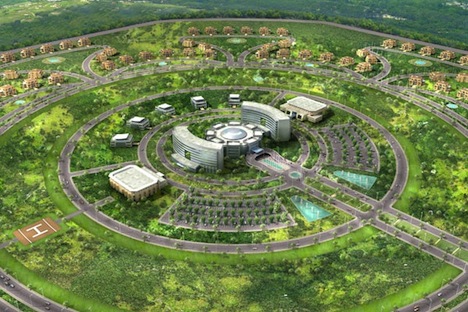Even as the world realizes that sub-Saharan Africa has a broad diversity of cultures, ethnicities, economies and political identities, Equatorial Guinea is far afield from anything ‘typical’ about the region. ![]()
With just over 700,000 people, it’s the least populous country on Africa’s continental mainland and, geographically, it’s divided between a rectangular province, Río Muni, nestled between Gabon and Cameroon, and an island, Bioko. As a former Spanish colony from 1778 to 1968, it’s the only country in Africa where Spanish is an official language. With abundant rainforest timber and with the discovery of oil wealth in the past two decades, Equatorial Guinea is also one of the richest countries in Africa — with a GDP per capita of between $15,000 and $36,000 (estimates vary wildly), it should be as developed as much of western Europe, though it’s not.
But the country’s idiosyncrasies don’t end there.
Its president, Teodoro Obiang, has led the country since ousting his uncle, Francisco Macías Nguema, in a coup in 1979. Despite the fact that he’s one of the world’s more repressive dictators, Obiang represents quite an improvement over his uncle, Francisco Macías Nguema, who controlled the country through an 11-year terror during which one-third of the country’s residents were killed or fled. During the Macías Nguema era, schools were closed to prevent the kind of education that might lead to an uprising, cocoa and coffee plantations were destroyed as its pre-oil economy tanked throughout the 1970s, and churches essentially forbidden because of the cult of worship under ‘papa Macías.’ Historians cannot decide whether Macías Nguema’s regime is more appropriately the ‘Dachau of Africa,’ or the ‘Auschwitz of Africa,’ but it was horrid enough to stand on its own terms.
Obiang, who as a top official in his uncle’s regime, shares some complicity for the horrors of in the 1970s, but initially effected the trial and execution of his uncle and relaxed the brutality that was decimating the country, though opposition and other analysts argue that his rule has become increasingly brutal throughout the years. Nonetheless, while his patience for opposition forces has never been strong, it’s been especially weak since a 2004 coup attempt that may have involved the son of former UK prime minister Margaret Thatcher.
Despite the fact that elections were held on May 26, the Partido Democrático de Guinea Ecuatorial (PDGE, Democratic Party of Equatorial Guinea), was pre-destined to win power in the Camara de Representantes del Pueblo (House of People’s Representatives), where it already held 99 out of 100 seats, and in the newly formed upper house, the Senado (Senate), where 55 of 70 seats were up for election, with the remaining 15 to be selected directly by Obiang. The PDGE isn’t really a political party in any sense, but more a mechanism for Obiang to extend dictatorial power — it’s believed that Obiang hopes to pass on the country’s presidency to his son Teodoro ‘Teodorín’ Obiang, a second vice president of the country and a former agricultural minister.
Although oil reserves were only discovered in the mid-1990s, Equatorial Guinea is the continent’s third-largest oil exporter after Nigeria and Angola, attracting US, European and Chinese foreign development. Its more recent discovery of natural gas reserves have only accelerated its GDP growth (which routinely hits double digits and beyond — it notched nearly 40% GDP growth in 2004, for instance). While that’s caused inflationary pressure in recent years, none of the GDP growth has trickled its way down to the majority of the country’s population — poverty remains high and development remains low. Continue reading Equatorial Guinea holds sham legislative elections
